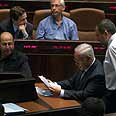
Four out of the five Labor members who opposed their party joining the coalition boycotted the first reading. MKs Ofir Pines-Paz, Amir Peretz, Eitan Cabel, and Yuli Tamir were also absent from the final reading. MK Shelly Yacimovich supported the bill in the third reading, saying that the real battle will be over the actual content and not the procedural elements of the budget.
The discussions prior to passing the bill started Monday at 8:00 pm and lasted until 8:00 am Tuesday morning.
Upon the conclusion of this exceptionally long discussion, Finance Minister Yuval Steinitz leveraged the opposition's wearing down into an achievement for the coalition.
"Your generous help was all for the best," Steinitz personally complimented opposition leader MK Tzipi Livni, who sat through the discussions all through the night. "The nighttime discussion made a contribution that cannot be measured in gold. It gave us yet another opportunity to demonstrate to the citizens of Israel the severity of this unconventional economic crisis that necessitates unconventional moves."
Steinitz promised, "We will put the skids under the crisis and the slowdown and will bring the economy into safe waters, but this will take time, determination, and patience."
Opportunity for opposition
The marathon discussion was held during the second reading of the bill during which dozens of reservations were submitted by members of the opposition.
Kadima faction spokesman who led the filibuster MK Shmuel Dahan said to Ynet, "This sends a message to the government and the coalition that nothing is going to be easy for them. We will respond to every move that hurts democracy and the citizens of Israel. This is just a rehearsal for what is in store for them in the 2009-2010 budget discussions."
Only two or three MKs remained in the Knesset plenum throughout the night, including opposition leader MK Tzipi Livni.
"This is the only way we can serve our constituents, to whom we swore to be a fighting opposition once it became clear we would not sit in the government. We are proving that we will not be like our predecessor, and we won't compromise on agreements with the government just to make the discussion shorter," said a Kadima spokesperson.
Discontent with new budget structure
The bill, which was passed Monday in the Finance Committee and in its first reading in the Knesset, is categorized as a temporary provision because it includes an amendment to Basic Law. Such a perfunctory and unconventional move as passing the bill in one long marathon discussion was the first political baptism by fire of the new government. As such, the coalition held on to its fragile front into the night by ensuring that no one be absent in the third, final, and decisive reading.
The bill was passed Monday in its first reading by only a narrow margin of 65 votes in favor because of the protest absence of five Labor members.
In addition to increasing the budget's time period, the bill also extends the stipulated time period during which the budget must be authorized, pumping up the previous 45 days to 107 days. The biennial budget is meant to be built as a uniform, 18-month framework, until the end of 2010, which is considered one budgetary period, but in reality combines two separate budget statements.
MK Oron (Meretz) claimed that the law is written in an hazy manner, rendering it unclear whether it includes one budget or two separate budgets. Oron asked the government how it can know what the rate of taxation will be next year and what will happen if the existing NIS 40 billion ($9.6 billion) deficit returns.
Oron continued, "The economists know that whatever happened happened, but don't know what will be in another year or two. Perhaps you too know that the biennial budget is not the final word and that following it will be more budgets and other economic plans." He also said that this exercise was done with one purpose in mind – to save NIS 1-2 billion ($240-480 million) to pay as a kickback to coalition partners if their votes need to be bought when passing the 2010 budget.















